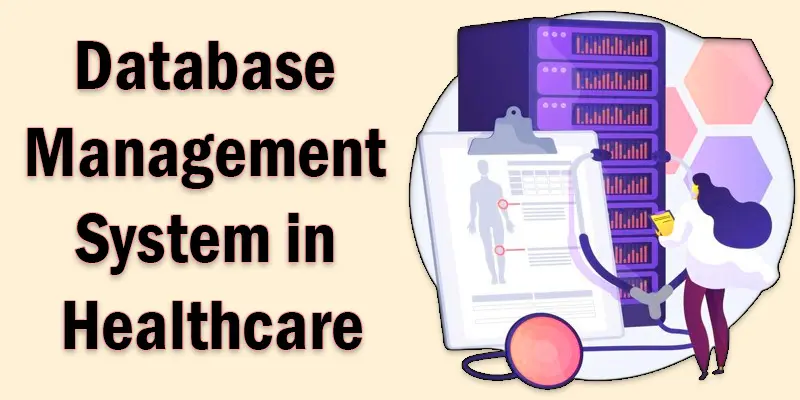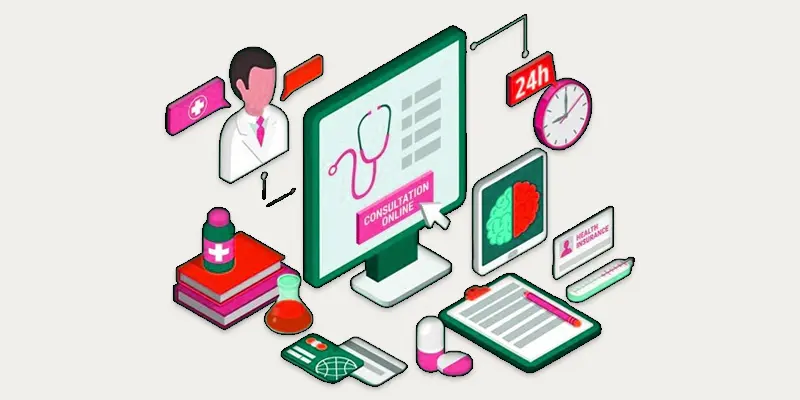Database Management System in Healthcare: Types, Benefits & Challenges
Published: 2 May 2025
Database Management System in Healthcare
A Database Management System (DBMS) helps hospitals and clinics keep all their important data in one place. It stores patient records, test results, doctor notes, and even billing info. This makes it easier for doctors and nurses to find the right information fast. With a DBMS, healthcare becomes more organized, safe, and efficient for everyone. It’s like giving hospitals a smart brain to manage everything smoothly.
Types of Databases Used in Healthcare
Hospitals and clinics use different types of databases to manage all kinds of information. Each type has its own way of storing and handling data.

Relational Databases
These are the most popular type used in healthcare.
- They store data in tables (like Excel sheets).
- Each table has rows and columns—easy to search and update.
- Great for storing patient records, appointment details, and lab reports.
- Example: MySQL, PostgreSQL, Oracle Database.
Real-life example: A hospital stores patient names, age, and test results in separate tables but links them together using a unique ID.
Cloud-Based Databases
These databases live on the internet, not on one computer.
- You can access them from anywhere, even from home.
- Very useful during emergencies or remote care.
- Keeps data safe with online backup and encryption.
- Example: Google Cloud Healthcare API, Amazon Web Services (AWS) HealthLake.
Real-life example: A doctor views a patient’s file from their phone using a secure cloud system.
NoSQL Databases
These handle large amounts of unstructured data (like images or reports).
- Unlike relational databases, they don’t use tables.
- Great for handling complex or flexible healthcare data.
- Example: MongoDB, CouchDB.
Real-life example: A system that stores X-rays, MRI scans, or doctor notes in a flexible format.
Operational Databases
Used for daily tasks and updates.
- Stores real-time data like current appointments, nurse schedules, or medicine inventory.
- Keeps the system running smoothly during busy hours.
Data Warehouses
These are used for analyzing old data, not for daily tasks.
- Stores big chunks of historical data
- Helps doctors and researchers find patterns and improve care
- Example: Tracking how many patients had the flu last year
Benefits of Using DBMS in Healthcare
A Database Management System (DBMS) helps hospitals and clinics manage huge amounts of data with ease. From patient records to lab results, everything is stored safely and can be found quickly.
Quick and Easy Access to Patient Information
With a DBMS, doctors and nurses can find patient details in just a few clicks. There’s no need to dig through paper files. It saves time, especially in emergencies when every second matters.
Better Accuracy and Fewer Errors
Manual records can lead to mistakes—like wrong names or missing lab reports. DBMS helps avoid such errors by storing information digitally. This means patients get the right treatment at the right time.
Improved Patient Care
When all medical data is in one system—doctor notes, prescriptions, and test results—healthcare teams can work better together. This leads to faster diagnosis and better treatment.
Strong Data Security
Patient data is private. A DBMS protects it using passwords, encryption, and limited access. Only trusted staff can view or edit sensitive information.
Easy Information Sharing
Different departments—like labs, pharmacies, and billing—can easily share data using the same system. This improves teamwork and avoids delays in treatment.
Saves Time and Money
DBMS reduces the need for paper, printing, and storage. Staff can focus more on patients instead of handling paperwork.
Helps in Research and Reporting
Hospitals can use stored data to find trends, create health reports, and support medical research. It’s helpful for improving public health and planning ahead.
Backup and Recovery
If data is lost due to a power cut or system error, a DBMS can restore it from backup. This keeps hospital work running smoothly without losing important records.

Challenges of DBMS in Healthcare
While a Database Management System (DBMS) brings many benefits to healthcare, there are also some challenges that hospitals and clinics face when using them.
High Cost of Setup and Maintenance
Implementing a DBMS can be expensive. Hospitals need to invest in software, hardware, and skilled staff to set up and maintain the system. This can be challenging for smaller healthcare providers with limited budgets.
Complex System Setup
Setting up a DBMS requires proper planning, data migration, and system customization. This process can take time and requires technical expertise. If done incorrectly, it could lead to problems in managing patient data.
Data Security and Privacy Risks
Even though DBMS systems are designed to protect patient data, there’s still the risk of cyberattacks, hacking, and data breaches. Keeping sensitive medical records safe requires strong encryption, regular updates, and monitoring, which can be difficult to manage.
Training and Staff Adaptation
Healthcare staff must be trained to use the new system. Some employees may find it difficult to transition from paper-based methods to digital systems. Ongoing training is essential to make sure everyone knows how to use the DBMS efficiently.
Data Compatibility Issues
Different healthcare systems often use different types of software or databases. Integrating these systems can be tricky. Sometimes, it’s hard for one database to communicate with another, leading to data silos and delays in information sharing.
Dependence on Technology
Since DBMS relies on technology, any system downtime, server crashes, or power failures can disrupt hospital operations. Hospitals need backup systems and strong IT support to keep things running smoothly.
Keeping the System Updated
A DBMS needs to be regularly updated to handle new features, fix bugs, and improve security. Without proper maintenance, the system can become outdated or vulnerable to security threats.
Real-Life Examples of DBMS in Hospitals
- Mayo Clinic (USA): Uses a cloud-based DBMS to store patient records and manage appointments, making it easy for doctors to access patient information from any location.
- Cleveland Clinic (USA): Implements an advanced relational DBMS to maintain patient data, treatment plans, and medical histories, helping doctors make quick and accurate decisions.
- NHS (UK): Uses a centralized DBMS to store health data from different hospitals, improving collaboration and ensuring that patient data is always accessible to healthcare providers.
- Apollo Hospitals (India): Utilizes a DBMS to store medical records and lab results, reducing errors and allowing for quick access to important information during emergency situations.
- Kaiser Permanente (USA): Uses an integrated DBMS to manage patient care, ensuring real-time data sharing between doctors, specialists, and pharmacists for better healthcare delivery.
Best Practices for Managing Healthcare Databases
Managing healthcare databases effectively is key to ensuring patient safety, data accuracy, and smooth hospital operations.
Ensure Data Security
Protect patient data with strong encryption, firewalls, and passwords. Make sure only authorized staff can access sensitive information to prevent data breaches.
- Tip: Regularly update security systems and use multi-factor authentication for added protection.
Regular Backups
Make sure to back up data regularly. This ensures that even if the system crashes, you won’t lose important patient records.
- Tip: Set up automatic backups to reduce the risk of data loss.
Data Standardization
Ensure that all data is stored in a consistent format. This makes it easier to search, update, and share patient information across departments.
- Tip: Use common standards like HL7 for healthcare data to improve compatibility.
Conduct Regular Audits
Regularly audit your database to check for errors or inconsistencies. This helps keep data accurate and up-to-date.
- Tip: Implement routine checks to find and fix mistakes before they cause bigger problems.
Train Healthcare Staff
Make sure doctors, nurses, and administrative staff know how to use the database system. Proper training reduces mistakes and improves data handling.
- Tip: Offer ongoing training to ensure staff stays up-to-date with system updates and new features.
Use Data Analytics
Leverage data analytics tools to spot trends, improve patient care, and streamline hospital operations. These tools can help in making informed decisions for better outcomes.
- Tip: Use data to predict trends, like patient volumes or disease outbreaks, to plan resources effectively.
Implement Access Controls
Not everyone needs access to all data. Set up role-based access so that staff only see the information they need to do their job.
- Tip: Review and adjust access permissions regularly to ensure they are still relevant.

Conclusion About Healthcare Database Management
We’ve covered database management systems in healthcare in detail.In order to enhance patient care, expedite processes, and guarantee data security, I advise healthcare providers to give DBMS top priority. Investing in the right DBMS can lead to better decision-making, increased efficiency, and safer environments for both patients and staff. If you’re ready to enhance your healthcare system, start exploring the best DBMS options today!
FAQS Data Management for Healthcare
A DBMS in healthcare is a system that stores and manages medical data, such as patient records, appointments, and treatment histories. It helps healthcare professionals access and update information quickly and accurately. This system ensures that patient data is stored securely and can be retrieved easily when needed.
A DBMS is important in healthcare because it ensures that patient data is organized, secure, and easily accessible. It helps reduce errors, improves patient care, and streamlines hospital operations. Without a proper DBMS, healthcare providers would struggle with managing vast amounts of sensitive data.
In healthcare, databases store patient information, medical histories, test results, and billing details. Doctors, nurses, and hospital staff can access this data instantly for better decision-making. It also supports research, patient tracking, and healthcare analytics.
The Relational Database Management System (RDBMS) is the most often used database type in the healthcare industry. It makes managing and searching data easier by organizing it into tables. Popular examples include MySQL and Oracle.
Databases are critical in healthcare as they keep patient data organized and secure. They enable quick access to medical records, helping doctors make informed decisions. A well-managed database also supports better communication between different departments in a hospital.
A DBMS is crucial because it ensures that large amounts of data are stored securely, without the risk of loss. It allows for easy retrieval of information when needed, improving efficiency. In healthcare, it directly affects the quality of patient care and operational success.

- Be Respectful
- Stay Relevant
- Stay Positive
- True Feedback
- Encourage Discussion
- Avoid Spamming
- No Fake News
- Don't Copy-Paste
- No Personal Attacks

- Be Respectful
- Stay Relevant
- Stay Positive
- True Feedback
- Encourage Discussion
- Avoid Spamming
- No Fake News
- Don't Copy-Paste
- No Personal Attacks





